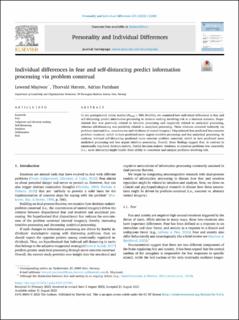Individual differences in fear and self-distancing predict information processing via problem construal
Journal article, Peer reviewed
Published version
Permanent lenke
https://hdl.handle.net/11250/3127304Utgivelsesdato
2023Metadata
Vis full innførselSamlinger
Sammendrag
In two preregistered online studies (NTotal = 984; Prolific), we examined how individual differences in fear and self-distancing predict information processing in decision-making involving risk in a business scenario. Dispositional fear was positively related to urgent and affective intuitive processing and negatively related to analytical processing. Self-distancing was positively related to analytical processing. These relations occurred indirectly via problem construal. Dispositional fear predicted less concrete problem construal, which in turn predicted more urgent intuitive processing and less analytical processing. In contrast, habitual self-distancing predicted more concrete problem construal, which in turn predicted more analytical processing and less urgent intuitive processing. Surprisingly, dispositional fear had a negative indirect relation with affective intuitive processing via more abstract problem construal, and habitual self-distancing had a positive indirect relation with affective processing via more concrete problem construal. Overall, these findings suggest that, in contrast to emotionally regulated decision-makers, fearful decision-makers’ tendency to construe problems less concretely (i.e., more abstractly) might hinder their ability to concretize and analyze problems involving risk. Individual differences in fear and self-distancing predict information processing via problem construal

